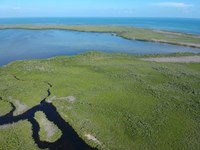ILEE Lunch Seminar 3/9
- https://ilee.unamur.be/events/ilee-lunch-seminar-3-9
- ILEE Lunch Seminar 3/9
- 2019-09-03T12:45:00+02:00
- 2019-09-03T14:00:00+02:00
- When Sep 03, 2019 from 12:45 PM to 02:00 PM (Europe/Brussels / UTC200)
- Where B33, Biology building, 3rd floor
-
Add event to calendar
 iCal
iCal
Speaker
 Frédéric Silvestre (Biology; URBE; head of Laboratory of Evolutionary and Adaptive Physiology)
Frédéric Silvestre (Biology; URBE; head of Laboratory of Evolutionary and Adaptive Physiology)
From aquatic ecotoxicology to neurodegenerative diseases: why killifish will do the job!
In URBE, we’re studying aquatic organisms from different points of view. One of the most important subjects are related to ecotoxicology, i.e. the study of fate and effects of pollutants on organisms. Since recently, the Laboratory of Evolutionary and Adaptive Physiology (LEAP) turned its attention to new model fish species belonging to the broad group of killifish.  The mangrove rivulus is one of these species presenting unique biological features such as a high adaptability to environmental changes and a mixed-mating reproductive system. It is indeed the only vertebrate capable to self-fertilize! It makes this tiny mangrove inhabitant a valuable model to investigate the effects of environmental stressors on natural isogenic and homozygous lineages (very low genetic variability) and to decipher the genotype x environment interaction. In the lab, we’re focusing our attention on neurotoxic compounds, one of the principal factors initiating neurodegenerative diseases in human. We have developed a multi-level approach combining molecular (mainly epigenetics), phenotypic (mainly behavioural) and field analyses on the mangrove rivulus. Our lab is now also developing research on a second killifish species, the turquoise killifish. This African buddy is reproducing classically but presents the particularity to
The mangrove rivulus is one of these species presenting unique biological features such as a high adaptability to environmental changes and a mixed-mating reproductive system. It is indeed the only vertebrate capable to self-fertilize! It makes this tiny mangrove inhabitant a valuable model to investigate the effects of environmental stressors on natural isogenic and homozygous lineages (very low genetic variability) and to decipher the genotype x environment interaction. In the lab, we’re focusing our attention on neurotoxic compounds, one of the principal factors initiating neurodegenerative diseases in human. We have developed a multi-level approach combining molecular (mainly epigenetics), phenotypic (mainly behavioural) and field analyses on the mangrove rivulus. Our lab is now also developing research on a second killifish species, the turquoise killifish. This African buddy is reproducing classically but presents the particularity to  be the vertebrate with the fastest aging process! It actually lives about 12 weeks and shows the aging mechanisms also observed in human. Together, these two new models will help to develop alternative vertebrate models to investigate the neurotoxicological origins of neurodegenerative diseases, and will demonstrate the advantages of a comparative approach in the interplay between the environment and human health. During this seminar, the two species will be presented, as well as few data from the lab and from recent field works in Belize and Florida.
be the vertebrate with the fastest aging process! It actually lives about 12 weeks and shows the aging mechanisms also observed in human. Together, these two new models will help to develop alternative vertebrate models to investigate the neurotoxicological origins of neurodegenerative diseases, and will demonstrate the advantages of a comparative approach in the interplay between the environment and human health. During this seminar, the two species will be presented, as well as few data from the lab and from recent field works in Belize and Florida.
Great photographs guaranteed!!
Please order your sandwich before Monday 2nd, 18h!!
carolin.mayer@unamur.be
Sandwich list here
 Institute of Life, Earth and Environment
Institute of Life, Earth and Environment
